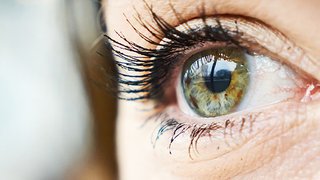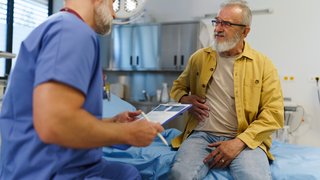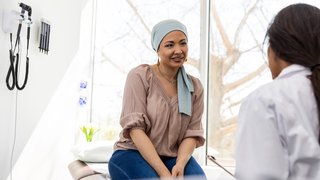Alternative medicines and cancer treatment: Can they help?
May 15, 2019
Complementary and alternative medicine: Are they good for cancer patients?
More cancer patients are turning to complementary and alternative medicine to cope with the rigors of treatment, but a study by UT Southwestern's Dr. Nina Sanford shows there are some risks involved, particularly with herbal supplement use.

A cancer diagnosis often comes as a shock to patients, and the road to recovery can seem daunting, filled with treatments and tests, surgery, and chemotherapy and/or radiation.
Many cancer patients turn to complementary and alternative medicines to try to cope with the emotional and physical chaos.
Hoping to measure the scope of this trend, my team and I analyzed data from the Centers for Disease Control and Prevention’s National Health Interview survey of more than 3,100 cancer patients. We found that, in fact, one-third of people with a cancer diagnosis use complementary and alternative medicines (CAM) such as herbal supplements, meditation, yoga, and acupuncture.
But a significant portion of those people, 29%, don’t tell their doctors about it. In the study, which was published recently in the journal JAMA Oncology, respondents said their doctors did not ask them about alternative medicines. Other said they didn’t think their doctors needed to know.
This is a troubling and dangerous trend, especially in the case of herbal supplements – the most common CAM. Many supplements are a mishmash of different things. If physicians don’t know what’s in the supplements – or don’t know a patient is taking them – it can interfere with conventional cancer treatments in a potentially harmful way.
4 reasons to avoid herbal supplements
Younger people and women are the most likely to use complementary and alternative medicines, our study showed. The numbers are so high that herbal supplements have essentially moved into the mainstream as cancer patients look for additional relief from nausea, pain, and depression.
“Many supplements are a mishmash of different things. If physicians don’t know what’s in the supplements – or don’t know a patient is taking them – it can interfere with conventional cancer treatments in a potentially harmful way.”
Nina Sanford, M.D.
But there are several reasons you might want to reconsider taking herbal supplements:
1. Supplements can interact and interfere with chemotherapy.
Studies have shown that the plant-based supplement St. John’s Wort, for example, can interfere with how the body metabolizes certain drugs by inducing the activity of certain enzymes. Typically used to help with depression, St. John’s Wort can ultimately diminish the effectiveness of chemotherapy drugs.
2. Radiation needs oxygen to work, through formation of free radicals.
Taking supplements with high amounts of antioxidants is thought to potentially make radiation less effective.
3. Herbal supplements can be expensive.
Dietary supplements are big business – a $30 million industry, according to The Journal of the American Medical Association (JAMA). Supplements can be quite expensive, while providing little to no benefit.
4. Perhaps most concerning, herbal supplements are not FDA approved.

Many herbal supplement manufacturers make claims that are not supported by robust, long-term research. Patients who believe that a particular supplement can cure or help prevent cancer may choose to avoid conventional cancer treatments altogether or delay recommended follow-up to monitor for recurrence. The most prominent example of this was Apple founder Steve Jobs, who reportedly used special diets, acupuncture, and other alternatives after receiving a diagnosis of pancreatic cancer. He turned to traditional medicine late in his battle with cancer and died in 2011.
If you or a loved are considering taking supplements during cancer treatment, the most important advice I can give you is to tell your physician about it. They can help determine whether or not the supplement might interfere with any of the cancer treatments they’re recommending.
Related Article: How exercise can help you outrun (or outwalk) cancer treatment symptoms
Alternatives that can help cancer patients
In general, as physicians we are cautious about the use of herbs and other supplements during cancer treatment. But there are alternative medicines and methods that can help with mood, energy, and conditioning, while also reducing the side effects from treatments. It’s important to note, however, that these treatments have not been shown to prevent or help cure cancer in any way.
- Acupuncture: A traditional form of Chinese medicine, acupuncture involves inserting very thin needles into the skin at pressure points to relieve pain. Some patients believe it can also help with nausea from chemotherapy treatments. Acupuncture is generally safe, as long as it is done by a licensed practitioner.
- Aromatherapy: A holistic healing technique that uses natural oils, aromatherapy may help some cancer patients with nausea and improve their mood.
- Meditation: The practice of clearing your mind and focusing on the present can have some benefits for cancer patients. It can lower your heart rate and blood pressure, and reduce stress, anxiety, and depression. It also eases muscle tension, which may provide temporary relief from chronic pain or fatigue.
- Tai Chi, Yoga, Exercise: Low-intensity and low-impact physical exercise can help with mobility, joint pain, and conditioning. We strongly advise patients to stay active and engage in exercise during treatment. A common side effect of radiation is fatigue. I let patients know that the people who feel the most fatigue are the ones who are the most sedentary. Those who exercise frequently have the most energy.
Overall, these therapies can help improve a patient’s mood and reduce the side effects from treatments, both physical and psychological. But I would never recommend that my patients do this instead of engaging in conventional cancer care.
Always check with your doctor first
As our study showed, the number of cancer patients using alternative medicines and methods has become significant, and it’s only likely to grow as more “miracle” products hit store shelves.
I don’t blame patients for being attracted to these supplements. They sell hope to people when they’re feeling hopeless. They offer relief during a relentlessly stressful time for your mind and body. And they promise a semblance of control over a condition that doesn’t easily yield.
But herbal supplements aren’t just a harmless placebo.
There can be real-life consequences when an herbal supplement interacts or interferes with conventional cancer treatments and could render chemotherapy or radiation less effective.
So while many alternative methods such as meditation and yoga may help with the collateral effects of treatment, herbal supplements pose a genuine risk for cancer patients. If you’re considering taking them, always discuss it with your doctor first.
If you or a loved have more questions about complementary and alternative medicines during cancer treatment, call 214-645-8300 or request an appointment online.











